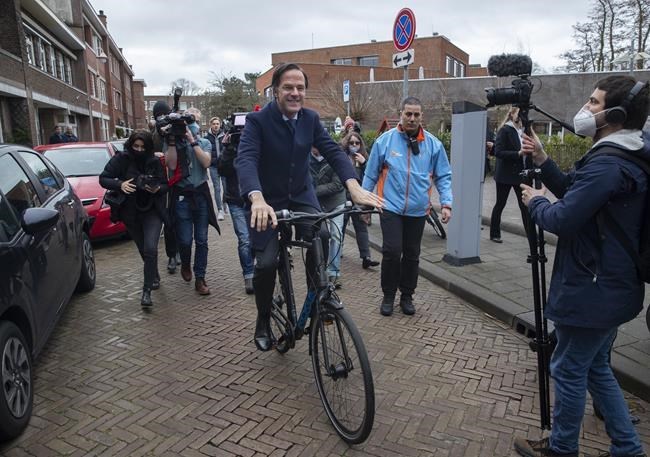THE HAGUE, Netherlands (AP) — Dutch Prime Minister Mark Rutte, the Netherlands’ longest serving premier, said Monday he will leave politics after an early general election sparked by a dispute over migration that led to his government’s resignation.
His decision means the end of nearly 13 years in power for the conservative leader sometimes called " Teflon Mark " because scandals that plagued his four different administrations did not stick to him.
Rutte, the 56-year-old leader of the People’s Party for Freedom and Democracy, or VVD, announced his decision at a hastily arranged parliamentary debate to discuss the fall of his latest governing coalition.
“Yesterday morning I made a decision that I will not be available again as a leader of the VVD. When a new Cabinet takes office after the elections, I will leave politics,” he said.
Rutte called it a “personal decision, regardless of the developments in recent weeks.” There was no immediate indication who might replace Rutte as leader of the VVD. The party’s parliamentary faction is led by Sophie Hermans, Rutte’s former political assistant.
No date has yet been set for the election, but it is not expected before October or November. That means that Rutte will likely remain in office as caretaker prime minister for months. He is expected to attend a NATO summit that starts Tuesday in Lithuania.
In the 27-nation European Union, only Hungarian Prime Minister Viktor Orban has been in charge of a country longer than Rutte, but their leadership styles could not be more different.
Orban, in power for a full 13 years and counting, has turned Hungary into his vision of an “illiberal democracy”and increasingly smothered all dissent, while Rutte navigated a Western democratic system at its most eclectic and exuberant.
But the Dutch prime minister's four-party ruling coalition resigned Friday after failing to agree on a package of measures to rein in migration, an issue that often has divided the EU as a whole. Rutte said it was a unanimous decision prompted by “irreconcilable differences” among the partner parties.
Supporters and opponents alike called it the end of an era.
With uncanny political savvy, Rutte at times managed to twist the arms of not just his coalition partners but also opposition lawmakers to pass new policies and remain in charge of governments that provided enough glue to hold together his politically fractured nation of nearly 18 million.
In the House of Representatives, the lower chamber of the Dutch parliament, no fewer than 20 parties are represented. To some extent, the diverse lineup reflects the European trend of the political center losing ground to voices on the far left and particularly the far right.
Rutte steered the Netherlands through crises ranging from the coronavirus pandemic and flooding to the shooting down of Malaysia Airlines flight MH17 over eastern Ukraine on July 17, 2014. Even his political opponents praised his handling of the aftermath of the plane's downing by pro-Russia rebels. About 200 Dutch citizens died.
Silene Fredriksz-Hoogzand, whose son Bryce and the son's girlfriend, Daisy Oehlers, were among the 298 passengers and crew members killed, said she and other bereaved families regularly met with Rutte to discuss efforts to establish the truth about what brought down the plane and to bring to justice those responsible.
“He attended many gatherings (of) relatives and has always been very compassionate and supportive. He always took the time,” Fredriksz-Hoogzand told The Associated Press.
“I personally regret that he steps back, but given the circumstances, I understand. But for (the) MH17 case, it is a loss in my opinion,” she added.
Rutte, who often cycles around The Hague to get to and from meetings, also became known for seeking forgiveness for past Dutch government policies.
When a parliamentary commission said that governments, several of which Rutte led, had put energy profits before the safety of people in northern Groningen province, where earthquakes from gas extraction destroyed homes and the lives of families, he apologized.
“We stand here cap in hand,” he said earlier this year.
Two years ago, his third government also resigned to take responsibility for a scandal involving investigations into child welfare payments that wrongly labeled thousands of parents as fraudsters, again hurting hundreds of innocent families. He pledged his government would continue working to compensate affected parents as quickly as possible.
“We are of one mind that if the whole system has failed, we all must take responsibility,” Rutte said.
Rutte's party nevertheless won the ensuing election, and he formed his fourth government with the same four parties that made up the coalition that collapsed last week. This time, though, the political rot set in early, and after 1 1/2 years, he was not only unable to hold together his coalition, he was accused by some of setting up its fall with demands that at least one party could not accept.
Despite the many scandals that tarnished his governments, Rutte remained popular among voters. His departure throws the election wide open and could open the door for a shift to the political left or further to the right.
Such was Rutte’s acumen to reconcile political fire and ice that he was mentioned over the years as someone to lead both the European Union and NATO. He has not pursued either post, yet.
Jesse Klaver, leader of the opposition Green Left party, said Rutte's stated exit from politics marked a “historic day” but that “his departure was unavoidable” as the prime minister's fourth and final coalition crumbled in acrimony.
Caroline van der Plas, leader of the Farmer Citizen Movement, a populist party that was the shock winner of provincial elections this year, was not ready Monday to declare herself a candidate to replace Rutte.
“At some point in the campaign, I will make it clear whether or not I will be running for prime minister,” she said.
___
Casert reported from Brussels.
___
Follow AP's coverage of global migration at https://apnews.com/hub/migration
Mike Corder And Raf Casert, The Associated Press



